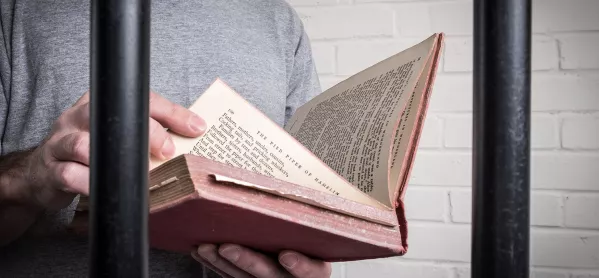
Call to give every prisoner access to digital learning

Every prisoner must have access to digital learning, the new chief executive of the Prisoners’ Education Trust has said.
In an exclusive interview with Tes two weeks into the role, Jon Collins called for a long-term national strategy to roll out digital technology in prisons.
“It’s essential that every prisoner has access to digital learning in a way that suits the educational work that they need to do,” he said. “In-cell technology must become the norm across the prison estate. It should be an automatic entitlement that is removed only in exceptional circumstances. Internet access for prisoners must be safe, secure and restricted, but should, as a starting point, be available to every prisoner in every cell in every prison in the country.”
He added: “What we want to see is digital technology used to enable learners to access materials, support feedback and assessments in a way that enables them to move forward. We need a proper strategy to roll out digital technology into prisons because [a strategy] is the place to look at, what are we trying to achieve? And what’s the best way of achieving that in a way that works for learners but also works for the prison system? I’m confident that this is doable.”
Tes magazine: How prison education changed in lockdown
Long read: Meet Jon Collins, the man standing up for prisoners’ right to learn
Need to know: Prison education must be reinstated, says charity
The lack of access to digital learning in prisons has created specific challenges during the Covid pandemic. While other areas of the education system were able to switch their provision to remote learning when face-to-face lessons were halted, prisoner educators was unable to follow suit.
The impact of Covid on prison education
In October 2020, the Prisoners’ Education Trust called for education to be reinstated in prisons, following reports of prisoners being locked down in cells for 23 hours a day with no access to educational services.
Prison educators told Tes earlier this month that they had been able to deliver work packs to prisoners to complete in their cells, but that the quality of education without an interactive element was declining.
In his March Budget, chancellor Rishi Sunak confirmed plans for extra funding to be given to prison governors specifically to be spent on “in-cell activities and extra technology”.
But Mr Collins told Tes that the Ministry of Justice and HM Prison Service needed to take the lead on setting out a clear vision and strategy on the roll-out of technology in prisons.
“There is an opportunity now to think about how the prison system recovers from the last year, which has had a huge impact,” he said. “Thinking has to be short term - how can we increase digital access now to deal with the fact that activities are likely to be curtailed for some time even as lockdown eases - but also as part of a longer-term strategy to massively increase the availability of digital technology and digital learning in prisons.
“We know that has to be a big part of the future. We know the technology is available to make that possible, so now we need to see leadership from the Ministry of Justice and HMPS in setting out a clear vision and strategy for what it will look like.”
Education ‘must be at the heart of prisons’
Mr Collins said that as prisons were expanded or newly built, education provision had to be at the heart of the plans.
“Education provision should be at the heart of the plans for those new prisons: that goes from proper classroom and other educational facilities in the prison, but also thinking about in-cell and distance learning, and what technology and facilities need to be available to make that work.”
And while, in the wider community, life is slowly returning to normal, in prisons restrictions are being relaxed at a much slower pace. The Prisoners’ Education Trust has a list of six Covid-safe changes it believes should be implemented immediately:
- Digital learning must be introduced as soon as possible - with investment, around 20 prisons could go digital within a few weeks.
- In-cell distance learning must be properly supported, with enough staff time to provide both the administrative and learning support needed.
- In-cell telephones must be rolled out in every prison to give learners access to increased and improved tutor support.
- Better in-cell learning materials while the lockdown continues - they must be tailored and accredited and progress must be recorded.
- Joined up thinking on education in prisons - joining the dots between in-cell digital and paper learning, tutor support and library provision.
- Recognition that education is as important for people in prison as it is for people in the community - it is not a transaction, a privilege or an unnecessary add-on.
A Ministry of Justice spokesperson said: “We are committed to developing prison education and investing in digital tools where this helps to deliver good outcomes for prisoners.”
You need a Tes subscription to read this article
Subscribe now to read this article and get other subscriber-only content:
- Unlimited access to all Tes magazine content
- Exclusive subscriber-only stories
- Award-winning email newsletters
- Unlimited access to all Tes magazine content
- Exclusive subscriber-only stories
- Award-winning email newsletters
You need a subscription to read this article
Subscribe now to read this article and get other subscriber-only content, including:
- Unlimited access to all Tes magazine content
- Exclusive subscriber-only stories
- Award-winning email newsletters
- Unlimited access to all Tes magazine content
- Exclusive subscriber-only stories
- Award-winning email newsletters